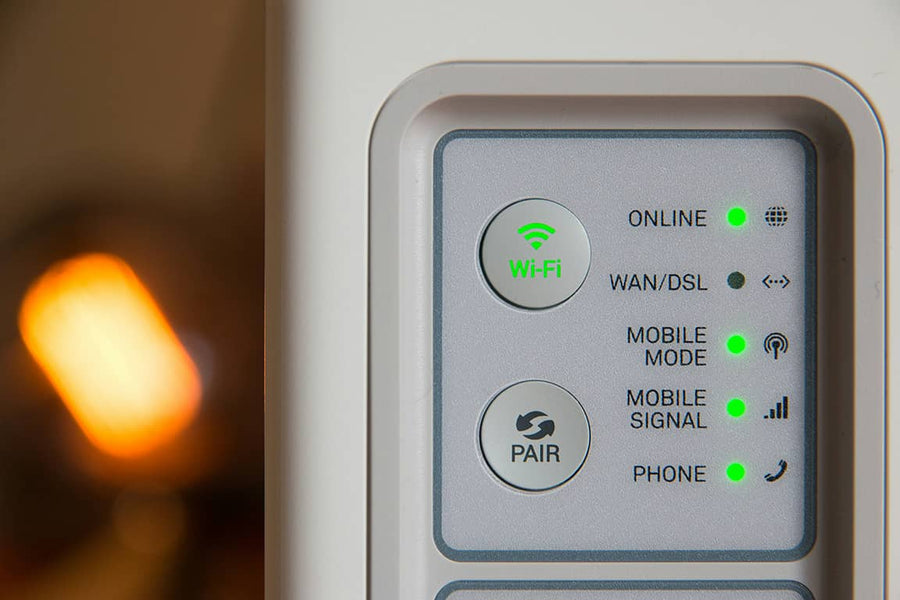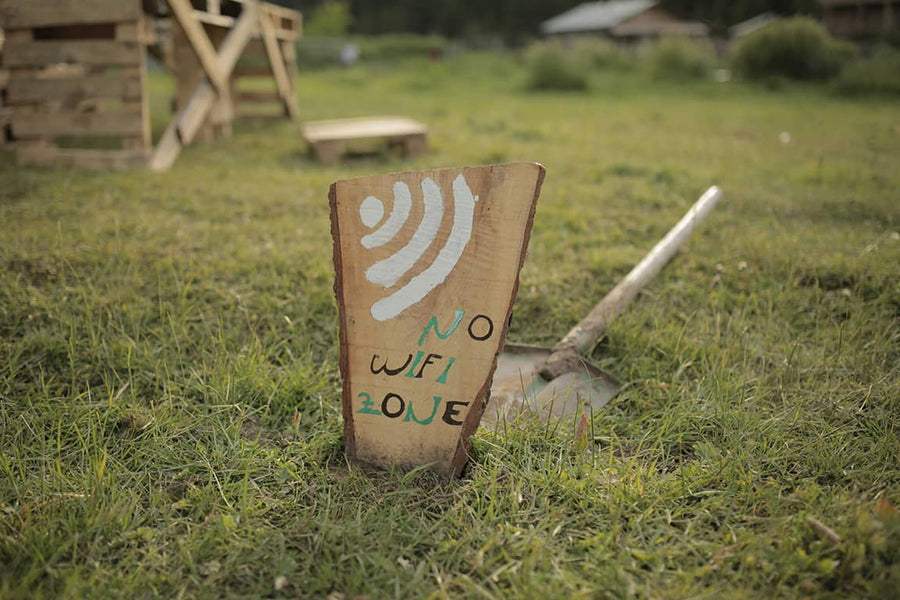With limited space and no traditional Internet options, truckers often ask if they can get consistent and reliable Internet in their vehicle.
With several options including cellular service or satellite, staying connected on the road may seem like a challenge, but our guide will get your truck ready with Internet service in no time without relying continuously on your personal cell service.
How do I get Internet in my truck: the options available
Due to the limited amount of space within a truck, averaging at least around 25 cubic feet, 24" deep by 24" high by 75" wide per minimum DOT legal sleeper, Internet can be a difficult but there are options... but which one is the right option?
We will help you figure it out by breaking down each option:
Rest Areas:
While on the road, you might run into free Wi-Fi in public locations right off the road, including rest areas. Free Wi-Fi is available in more than 200 rest areas nationwide.
This public Wi-Fi option is available to anyone within the vicinity of the rest area, giving you Internet for your truck or semi-truck, but naturally, you'll lose connection as soon as you move away from the rest area.
Having trouble finding free Wi-Fi in rest areas?
There are some great apps such as Rest Stops Plus and Trucker Path that can assist you in locating the perfect rest area without finding an Internet provider.
Your Cell Service:
That's right, your own cellular phone can double as a hotspot for your Wi-Fi needs. Most cellular plans come with a small allotment of data for tethering (= sharing your phone data with another device) or to broadcast your phone as a hotspot.
This is typically already included in your plan, simply contact your cell phone provider for more information, as not all plans allow tethering or hotspot, or impose a data cap on tethering.
...or use a dedicated mobile data plan:
Some data carriers offer at little to no extra cost a separate SIM card for a secondary device, such as a tablet or a hotspot.

Satellite:
Satellite option may be an option for your truck if you're looking for consistent Internet. While needing to mount the dish to receive Internet service, satellite can offer Internet for your truck.
It tends to be fairly expensive overall: the data package options are usually pricy and often limited, and so can be the satellite dish!
Prices may very along with data package options, as not all satellite offerings allow unlimited data. Mounting a dish on your truck may also cause issues in terms of clearance when driving.
In other words, it may add height verticality to your truck that may be difficult for low-clearance bridges or legal height limits for trucks.
Cellular Data: the most flexible option on the road
With all the options presented, which option is the best for your truck? Cell based technology is the answer.
With a flexible data plan, your Wi-Fi will provide fast speeds with consistent signal while on the road. With a minimalist setup, it is the best option on the road. Most hotspots and cellular routers do not use much space.
Need a quick setup right away? Going to your provider for a mobile hotspot today and get connected right away for your truck or semi-truck.
While most providers do not offer unlimited data for hotspot, the flexibility of options without sacrificing much space allows cell based service to be a compelling option.
Compared to RVs or camping vans which can go off-road, most trucks will stay on the road, which allow sufficient signal for continuous coverage.
Can I have unlimited data for my truck?
Although needs can vary, most truckers want an unlimited, unthrottled option. Unfortunately, most providers offer unlimited data with the caveat of reduced speed after a certain amount of data, also known as a data cap.
Most data plans for hotspot needs are expensive due to the fact that there's no public option available.
With that said, the better question might be how much data do you need for your truck?
How much data do I need for my truck?
Since most truckers live on the road, most trucker needs would be similar to home usage.
In other words, the average Internet usage at a home is around 641 gigabytes / month with an average home data plan. That's a lot of data!
However, most truckers drive an average of up to 11 hours during a typical day.
With this in mind, selecting a data plan with a budget can allow for more data than you think.
While streaming options such as streaming, Netflix or YouTube videos and gaming can use a lot of data, other avenues of data such as web browsing, email, music, and audio recordings do not use as much data.
Staying connected on the road is important, so aim for getting large data plans around 300-500GB if you intend to use the Internet heavily, while some light users can get away with using as little as 100GB monthly.
Do note that download speed doesn't equal data quantity. Having unlimited data doesn't mean you'll download faster, it'll just mean you can download more.
A 4G data plan will not offer you the same level of comfort as a 5G data plan.
EZ Mobile Data has got your needs covered with an 800GB data plan (much more than the average of 641GB/month!): high speed Internet on the 5G network, unthrottled, no speed cap, and most importantly no contract, no lease for more flexibility.
If you still want more data, we also offer unlimited mobile data!
Are data plans fast enough to game online and stream video / audio in my truck?
With a 5G data plan and an average download speed of 114mbps, your truck will have no problem when it comes to reliable speed from a provider, the main worry are data caps and the specific device you have for your service.
You'll need a minimum of 10-25 Mbps download and 5-10 Mbps upload suits most online gaming / video streaming needs.
For gaming specifically, you'll need a ping of ideally 30-40ms latency, which your data plan will be sufficient for.
With your average provider placing a data cap after your allotment of data, it's important to track your usage accordingly.
Make sure your data carrier provides you with access to the 5G network, otherwise you may struggle in some games, such as FPS, that require low latency.

How does a hotspot work?
Hotspot, also known as Mi-Fi, is a dedicated device that broadcasts Internet for several devices to connect at the same time. Think of hotspots as home based routers with mobile data.
The hotspot connects to a cell tower just like your cell phone. It then broadcasts Internet for you via a Wi-Fi signal from hotspot, creating a connection to the Internet for all of your computers, cell phones, tablets, and devices.
Price for a typical 5G hotspot ranges from $200 to $300 - and 5G routers can be even more expensive.
Cellular Data: Tethering vs Hotspot?
The question of tethering / mobile hotspot from your phone as opposed to a dedicated hotspot device is something to consider. Most cellular data plans allow usage or mobile hotspot directly from your cellphone, usually under Settings > Cellular.
Here are the pros and cons of this option:
Pros:
- Quick and convenient: You typically do not need any setup, just go to your settings and start enjoying 5G speeds from your smartphone!
- Little to no additional cost: Your cellular data plan typically has an allotment of hotspot data for usage that you already pay for, with the average hotspot allotment around 10-50GB monthly depending on your cell service.
Cons:
- Data cap: All providers impose a data cap which will not allow you to use sufficient amount of hotspot data from your phone. You can quickly burn through an allotment within a few hours!
- Battery life: Tethering or mobile hotspot from your phone uses a lot of battery, which can overheat your phone and cause leakage or "bulging" of your battery. It may also reduce the overall battery life. Most current phones will warn you of overheating.
- Wi-Fi signal: Although convenient, a typical smartphone cannot broadcast Wi-Fi signal as good as a dedicated hotspot device.
Looking at the pros and cons, most users would opt for a dedicated hotspot for their Internet needs on the road.
Public Wi-Fi Hotspots
As we've mentioned earlier, public Wi-Fi from rest areas for example remain an option. In terms of cost, it's generally unbeatable because it's free, but free comes at a cost.
The main problem is that it's very unreliable as you depend on the rest area you'll end up at, and you'll have to be close to the source.
Wi-Fi repeaters can partly solve the problem of distance, but they can be costly and driving your truck away will naturally cut your connection off!
You are also sharing the Wi-Fi hotspot with dozens of other users, which means you may experience slow downloading speed, and maybe more importantly, you'll be on an unsecure, unprotected network.
We overall do not recommend using public Wi-Fi as your main access to the Internet.
Satellite Internet for Truckers: Probably overkill?
Satellite Internet for your truck isn't recommended. Not only are more plans expensive, but generally require modifications to your truck. This can involve drilling, and can also cause clearance issues as described earlier in this blog.
Although you won't have to worry about data caps and works off-road, this option doesn't work well under trees and tall buildings, has higher latency than cellular, and typically more expensive than cellular options out available.
With that being said, if you need to work internationally, it might be a good option to consider, as satellite Internet has the best international coverage... at a cost!
How much should I pay for Internet for my truck?
With different data plans, options and offers, figuring out how much to pay for Internet on the road can be tough.
With satellite being the most expensive, you might pay upwards of $150 monthly or more for this option, and that's not even including the satellite dish which will cost anywhere between $100 and $600, not including installation.
If you decide to go the cellular route, which we recommend, a router can be expensive, but the cheaper option is a typical hotspot which will cost you $200 to $300 as an additional device, normally just a one time cost.
Bear in mind some providers charge extra to access the 5G network, so speed may be limited.
For a cellular data plan, you could pay as little as $50 monthly for 100GB or unlimited options for as low as $120 monthly.
Consider EZ Mobile Data's offerings: we offer the best value with prices as low as $120 monthly for 800GB of 5G data, more than enough for your trucking needs! Better yet, we can also bundle a hotspot for you to save you from the headache of finding one yourself.
Conclusion: What’s better for you?
With the cheapest options being your own smartphone for hotspot data, you need to keep in mind the limitations of choices for mobile plans for your truck.
Most plans only allow a certain amount of data, with data-only plans for dedicated hotspots that can range from $50 all the way to hundreds of dollars monthly for service, depending on the options and providers.
Most truckers rely on cellular service, and a lot of them already trust EZ Mobile Data with their Internet needs.
Consider a dedicated hotspot from EZ Mobile Data to simplify your choice with no contract options and generous return / exchange policy.








